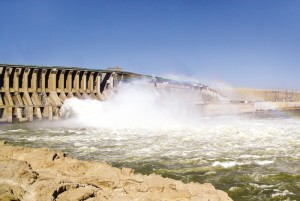 Following the Gulf funded extension of the Roseires Dam in 2013, Sudan is further looking to harness the country’s huge hydropower potential in order to boost power generation, while investment opportunities in renewables are also available
Following the Gulf funded extension of the Roseires Dam in 2013, Sudan is further looking to harness the country’s huge hydropower potential in order to boost power generation, while investment opportunities in renewables are also available
Provision of basic services such as electricity remains closely linked to economic growth. Electricity services are particularly essential, and it is one of areas that the Sudanese government has given increasing attention to in recent years.
In a country which not so long ago was only capable of producing 200 megawatts (MW) of electricity, this has increased dramatically over the last decade with capacity standing now well into the thousands of megawatts, meaning power is reaching far more people in more remote areas, with shortages and outages also becoming much less of an occurrence.
While Sudan’s energy mix has traditionally been dominated by oil, the recent power push has largely been generated by better investment in hydroelectricity.
For example, the Chinese funded £1.2 billion, 174km Merowe Dam situated on the River Nile finished construction in 2009 and consequently doubled the country’s power generation at the time.
Furthermore, in one of the biggest development projects to hit Sudan lately, the Roseires Dam on the Blue Nile in the south of the country was expanded last year (this time by Gulf donors), boosting not only the existing dam’s power supply, but also further downstream in the Merowe plant, as well as improving irrigation and agricultural productivity in the area.
With these projects alone having dramatically enhanced Sudan’s power generation capacity in such a short space of time – and with the demand for electricity constantly growing amongst the country’s rapidly urbanizing and industrializing population – along with initiating projects to increase generation further still, the Government is now working to establish an extended national grid network.
Under the Ministry of Electricity and Dams, five state companies replaced the National Electricity Corporation in 2010 with the responsibility of generation, transmission and distribution of electricity in Sudan, while also charged with improving overall efficiency and creating a more attractive environment for investors.
One major joint mission of these companies is to connect all the states of Sudan with one stable electrical transmission network by the year 2015.
The role of foreign investment is, of course, essential to achieving this goal, with the installation of transmission lines expected to see major growth amidst the wide availability of investment opportunities.
Already Sudan has seen significant funding by the Chinese Government in its power line development initiative, while work that has begun on the Abu Hamad transmission line is being supported by Qatar.
And with so much more anticipated in terms of Sudan’s electrical energy industry on top of the advancing conditions of the business climate, now is the right time for electrical generation and distribution companies to discover new opportunities and markets.
Aside from the country’s evident vast potential to produce power from hydro sources along the River Nile, there are also great prospects in the area of renewable energies.
“In addition to the transmission lines, we also have thermal plants which are going on now and connecting the whole of Western Sudan,” says the State Minister of Electricity and Dams.
“We are focusing on renewable energy, such as thermal, solar and wind generation, and we are also looking at biomass and geothermal.”
In a region which has extremely high solar intensity, solar (as well as wind) installations can already be found in Sudan.
However projects remain on a relatively smaller scale as the Government continues to seek greater foreign financing. Furthermore, with Sudan’s enormous agricultural resources, biomass is also becoming a viable power generator – with Chinese investors again becoming the first to embark on a bio-energy project there.
Going forward, considering the abundant opportunities available to foreign investors, Sudan’s Ministry of Electricity and Dams is keen to emphasize the need for the private sector to lead Sudan’s strategy for alternative energy – which is seen as key to increasing access, and thus, lessening deprivation.
“We want clean energy, cheaper energy and energy that people who live far away from the national grid can access. In turn, this will help reduce poverty.”















